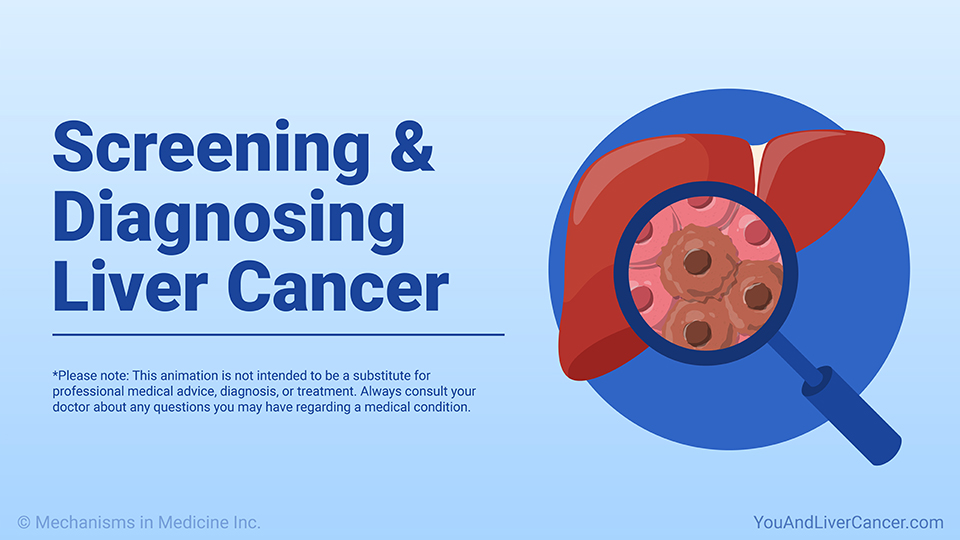Screening and Diagnosing Liver Cancer
*Please note: This slide show is not intended to be a substitute for professional medical advice, diagnosis, or treatment. Always consult your doctor about any questions you may have regarding a medical condition.
What is liver cancer?
Liver cancer is cancer that starts in the cells of the liver. This is called primary liver cancer. While other cancers can spread, or metastasize, to the liver, only cancer that starts in liver cells is called liver cancer.
The goal of liver cancer screening is to find liver cancer early in people who are at risk, when treatment is more likely to achieve a cure.
Different types of liver cancer
The most common type of liver cancer is hepatocellular carcinoma, or HCC.1 The second most common type is bile duct cancer, or cholangiocarcinoma. However, 9 out of 10 liver cancers are HCC.2
There are also other rare types of liver cancer.
Who is at high risk for liver cancer?
You have a high risk of liver cancer if your liver has developed a condition called cirrhosis, in which inflammation and scarring form in the liver.
Who is at high risk for liver cancer?
Your risk is also high if you have one or more liver conditions, including metabolic liver disease (MASLD), viral hepatitis, heavy alcohol use, or one of several inherited liver diseases.3,4 Metabolic liver disease occurs in people who are overweight or have diabetes, and is an increasingly common cause of liver cancer. Talk with your doctor about your liver cancer risks.
Blood tests can often show chronic liver disease and hepatitis B or C.
People without chronic liver disease can develop primary liver cancer, but this is rare.
What are the symptoms of liver cancer?
Liver cancer may not always cause symptoms, especially at first. If it does, you may have less appetite, feel bloated, or lose weight.
Some people develop a yellow tinge to their skin and eyes, called jaundice, or have pain in the upper right side of the abdomen. Talk with your doctor about any of these symptoms.
Who should be screened for liver cancer?
If you have a high risk of developing liver cancer, you should undergo regular screening tests.
This means you will be tested regularly even if you have no symptoms. The goal is to find cancer at an early stage when it is easier to treat and survival is improved.
What does liver cancer screening involve?
Liver cancer screening can include an ultrasound of the liver every 6 months, plus a blood test called AFP to look for a protein that can indicate liver cancer.5
Diagnosing liver cancer
To diagnose liver cancer, your doctor will also talk with you about your medical history and do a physical examination.
You may have additional imaging tests such as a CT scan or MRI, and additional blood tests.
Your doctor may also want you to have tests for treatment planning, including liver function testing. Liver function tests (LFTs) indicate levels of enzymes the liver produces. They can show your doctor if the levels of certain liver chemicals are normal or elevated.
Diagnosing liver cancer
Liver cancer is one of the only cancers that can be diagnosed in high-risk patients using imaging (without biopsy) in some cases. If you are not having surgery, you may need a biopsy. Your doctor will take a small sample of tissue from the liver to look for cancer cells.5
What is liver cancer staging?
Once liver cancer is diagnosed, the next step is staging. This refers to how large the cancer is and whether it has spread outside the liver. Your doctor will use your combined test results to determine the cancer stage.
Liver cancer staging systems: Barcelona Clinic Liver Cancer system
Doctors use different staging systems to describe liver cancer. The Barcelona Clinic Liver Cancer system (BCLC) is one of them.
BCLC stages include the size and number of tumors and whether you have symptoms, as well as liver health and activity level.6
Liver cancer staging systems: American Joint Committee on Cancer
Another staging system is the American Joint Committee on Cancer's tumor-node-metastasis system. It measures the tumor's size and location, whether any lymph nodes are involved, and whether the cancer has spread (metastasized) to other areas of the body.
Take care of your liver health
Since liver cancer does not always cause symptoms, it's important to know if you are at risk and need regular screenings.
Talk with your doctor about your risk for liver cancer. You can also find information on ways to keep your liver healthy at bluefaery.org.
References
- Asafo-Agyei KO, Samant H. Hepatocellular carcinoma. StatPearls. Last revised: June 12, 2023.
https://www.ncbi.nlm.nih.gov/books/NBK559177
- Garikipati SC, Roy P. Biliary tract cholangiocarcinoma. StatPearls. Last revised: February 6, 2023.
https://www.ncbi.nlm.nih.gov/books/NBK560708
- American Cancer Society. Can liver cancer be found early?
https://www.cancer.org/cancer/types/liver-cancer/detection-diagnosis-staging/detection.html
- MD Anderson Cancer Center. Liver cancer screening exams.
https://www.mdanderson.org/prevention-screening/get-screened/liver-cancer-screening.html
- National Cancer Institute. Liver cancer diagnosis. Last revised: July 1, 2022.
https://www.cancer.gov/types/liver/what-is-liver-cancer/diagnosis
- Blue Faery. The Adrienne Wilson Liver Cancer Association. Key information guides treatment. In: Liver cancer: A treatment guide for patients and their families (3rd ed).
https://www.bluefaery.org/patient-education
This slide show will help you understand
screening and
diagnosis of
liver cancer. The goal of
liver cancer screening is to find liver cancer
early in people who are at risk when treatment is more likely to achieve a cure. Click through to learn about
risk factors for developing liver cancer, how liver cancer screening is conducted,
symptoms to be aware of, and the
tests used to diagnose liver cancer, including
imaging tests,
liver function tests,
biopsy, and
staging. Staging refers to how large the cancer is and whether it has spread outside the liver. Your doctor will use your combined test results to determine the cancer stage. Since
liver cancer does not always cause symptoms, it's
important to know if you are at risk and need regular screenings. Talk with your doctor about your risk for liver cancer.
-
Share with family and friends:
Click here to take our SURVEY
Your feedback is important to us! We will use your feedback to develop future areas of content about liver cancer which will help other patients, caregivers, and families.



































